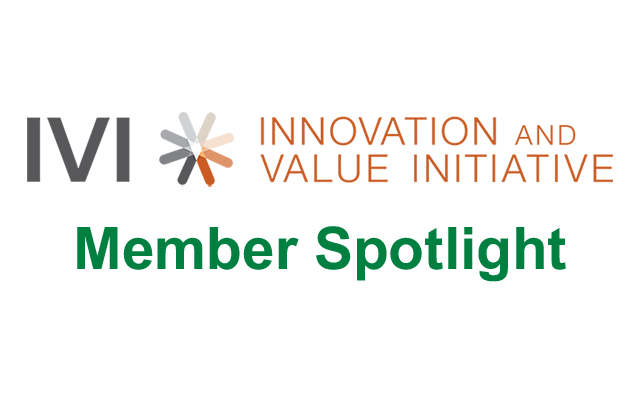 Earlier this summer, we had a chance to speak with one of IVI’s new members, Ms. Nelly Ganesan. Currently, she serves as the Executive Director of External Affairs and Health Equity at Morgan Health, a division with JPMorgan Chase. Nelly is a new member of our Board of Directors and is serving on IVI’s Health Equity Initiative Steering Committee. With her long focus on improving access to care and health equity, Nelly brings a fresh perspective to our organization.
Earlier this summer, we had a chance to speak with one of IVI’s new members, Ms. Nelly Ganesan. Currently, she serves as the Executive Director of External Affairs and Health Equity at Morgan Health, a division with JPMorgan Chase. Nelly is a new member of our Board of Directors and is serving on IVI’s Health Equity Initiative Steering Committee. With her long focus on improving access to care and health equity, Nelly brings a fresh perspective to our organization.
Thank you so much for taking the time to speak with us today. Please tell us a little bit about yourself and your background.
Since the start of my career, I have realized that issues of equity have real impacts on people’s lives – whether they have the ability to save for retirement, have access to quality health care, or can afford the astronomical out-of-pocket costs associated with their health. As it relates to these fundamentals, I’ve been increasingly more interested in how value assessments can be utilized to validate higher quality, lower costs, and improved equity.
I’m currently leading the health equity work at Morgan Health, a new entity within JPMorgan Chase, the financial institution. We are focused on improving the quality, equity, and affordability of employer-sponsored insurance (ESI) for individuals who receive their care through JPMorgan Chase (employees and their dependents). Often, the relationship between the employer and the insurance carrier isn’t necessarily to talk about the quality, affordability, and equity of health care for your employees. By trying to better understand whether outcomes are improving, the impact of preventative care, and other metrics often not considered from the employer perspective, we hope to find solutions in the marketplace and work more closely with our insurance carriers.
IVI is pleased to see a large employer like JPMorgan thinking about value and healthcare, especially as it relates to its employees. We believe that employers have a vested interest in value assessment but don’t always know how to tackle it.
The reality is that employers and their employees often do not know that value assessment exists unless they have a problem. Employers usually have a strong business case to link health care and economic modeling per se, thus these assessments are less meaningful or useful to them. One of the reasons that I am excited to work with IVI is that I see my current role and the work of IVI as a “translation point” to help employers better understand value assessments, specifically in disease areas that are more prevalent in the ESI space. In the long term, employees need a better understanding of how healthcare decisions are made and what it means for them in terms of how people can access care.
In terms of advancing equity across your organization and your background, we were particularly pleased that you were able to be part of the Steering Committee for IVI’s Health Equity Initiative. How do you think this work can help advance research methods that advance the principles of health equity?
Health equity shouldn’t be a standalone activity, it should be integrated into everything that we do. At Morgan Health, we are committed to building an equity component throughout our work – all solutions should look at the full complexity of populations including age, race and ethnicity, gender, geography, where we have the ability to do that. If you are going to use an assessment tool to make a decision about access to a therapy, you must account for these differences.
IVI’s Health Equity Initiative is a concrete example of how we are working to develop actual methods and approaches to improve value assessment. All of us who are on the Health Equity Committee do some aspect of this work. It is hard. That’s why you don’t see it everywhere. It’s not unlike quality improvement which is now embedded into every kind of practice. That was hard. And it took 20 to 25 years to get to where it’s common practice to see hospitals that are accredited for purposes of quality improvement across the nation. I’m not saying that this is going to take 25 years, but it will not happen overnight and it won’t happen without the leaders who are committed to this work.
What from your work, and from your perspective, both on the Board and on the Health Equity Initiative do you see as one of the biggest challenges facing value assessment today?
From where I sit, one of the challenges to me is around adoption – who uses value assessment tools and for what.
Oftentimes, there’s the assumption that value assessments are only useful for pharmaceutical companies. If we narrow the scope to only entities that are developing drugs, we will miss out on key elements that should be included in value assessments. Our focus, as a member of the Board, is to continue to accelerate and expand use of the great tools that have been developed to date.
What would you tell other organizations or individuals is the value of joining and working with IVI?
You can be part of a set of leaders laying the path as an early adopter of a tool that’s being developed to make better decisions and improve outcomes for patients. It is exciting to be part of an early effort and to help diversify the perspectives brought to this endeavor.
Thank you Nelly and we are thrilled to have you as part of our organization.
